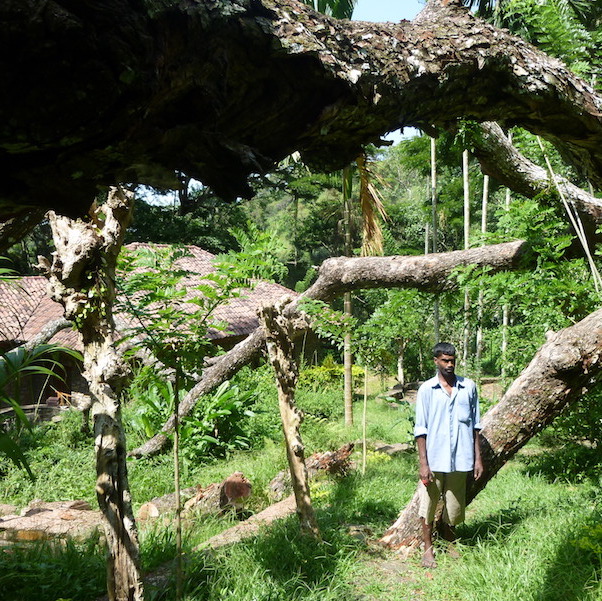Take a brake in paradiseExperience life in our organic farm Dikkapitiya “That’s almost as if I were in the operation room at home!” The surgeon from Munich adjusts his glasses and carefully inserts the small wooden stick into the cup-shaped vanilla flower. The sun has just risen – only in the early morning hours and only for a few days the vanilla flowers can be pollinated, and this is Dr. Braun’s job today. He has been on the farm in Dikkapitiya for four days now, and he wants to do more than just strolling around or being lazy. When he arrived he turned off his phone and laptop. If you want to be free for something new, you better respect some rules. If you want to be available everywhere, you are nowhere really in the end. “In only a few days, I have learned so much here – about nature, plants, animals, and especially about myself”, says the 50-year-old doctor and he is curious to learn more.
The multifaceted nature in and around the organic farm Dikkapitiya is inconceivable – the tropical mountain jungle, the tea gardens, the cinnamon and pepper plantations, the vanilla plants with their fragile flowers and the unspoiled nature in the neighboring nature reserve. Countless medicinal plants grow here which are collected when needed and cocked or pressed to make natural medicine. It is a small Garden of Eden. Monkeys look over the visitor’s shoulders, peacocks strut around without any fear, everywhere tracks of wild elephants which, however, you better observe only from a safe distance, a raised hide for instance. You cannot master nature by force and you cannot live against but must live with nature, that’s the credo of Shiran Silva, the farm’s director. Many years we were fighting against weeds and thorns only with a hoe – the temptation to spray chemicals was sometimes great”, he explains. “I thought our boss, Michael Kreitmeir, was mad but today I know, the hard work was worth it”, the Singhalese adds. He points to an almost palm-sized butterfly, to numerous flowers, a monitor lizard snoozing lazy on a rock in the sun. “It was like a kind of rebirth, life in all its diversity came back. With the insects birds came and quickly there were hares and mountain deer, peacocks – new life everywhere”. Shiran points to a track of a mountain leopard and he is proud that this nowadays rare animal has found one of the last wildlife refuges in Little Smile’s natural park. But not all animals are welcome to him: monkeys cause immense damages, there are simply too many of them because there is not much left of the formerly large mountain jungle in the UVA province. The wild boars too are a problem, but natural cultivation has its price – who would know better than Shiran Silva. The graduated philosopher has left the books and his convenient desk already in 2007 and exchanged them for a machete and a shovel and although his former colleagues called him crazy he has never regretted it. There are more and more people coming from the capital six hours away amazed by a world which they considered to be already extinct. “They don’t want to return to their hectic and unnatural world”, the farm director recognized. When Shiran Silva started his work here, he was not healthy he had problems with his heart and did not sleep well. Unbelievable if you look at the lean wiry man who seems to walk up and down the farm’s 350 meters altitude almost playfully. There was a day when Michael Kreitmeir brought visitors from the faraway Germany to the farm. They were visiting the children’s village Mahagedara and Kreitmeir wanted to show them that Little Smile is more than only a children’s aid organization. A life with, for and also from nature – in Dikkapitiya this is reflected and comprehensible everywhere, just live a few days here and learn how to peel cinnamon, dry pepper, pick cloves, distinguish poisonous from healing plants or hand-pollinate vanilla. In the evening we cook together, often what we have found in the jungle during the day, like jack fruit or breadfruit – refined with some fresh spices. A curry cooked on a wood-fire is something you really have to experience in a world that gives you an idea of how it was when Sri Lanka was still called Ceylon and people were living together in harmony with the wonderful tropical nature, at a time when this small island was close to be what is pictured as a paradise.
|